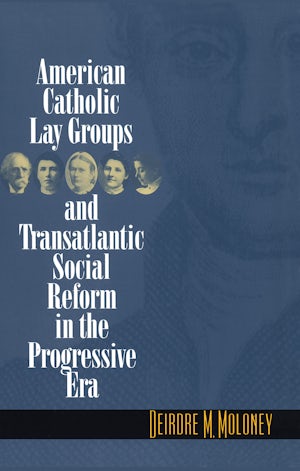American Catholic Lay Groups and Transatlantic Social Reform in the Progressive Era
By Deirdre M. Moloney
288 pp., 6.125 x 9.25, 10 illus., notes, bibl., index
-
Paperback ISBN: 978-0-8078-4986-6
Published: March 2002 -
E-book EPUB ISBN: 978-0-8078-6044-1
Published: April 2003 -
E-book PDF ISBN: 979-8-8908-7463-4
Published: April 2003
Buy this Book
- Paperback $42.50
- E-Book $29.99
For Professors:
Free E-Exam Copies
Rather than simply appropriate American reform models, ethnic Catholics (particularly Irish and German Catholics) drew extensively on European traditions as they worked to establish settlement houses, promote temperance, and aid immigrants and the poor. Catholics also differed significantly from their Protestant counterparts in defining which reform efforts were appropriate for women. For example, while women played a major role in the Protestant temperance movement beginning in the mid-nineteenth century, Catholic temperance remained primarily a male movement in America. Gradually, however, women began to carve out a significant role in Catholic charitable and reform efforts.
The first work to highlight the wide-ranging contributions of the Catholic laity to Progressive-era reform, the book shows how lay groups competed with Protestant reformers and at times even challenged members of the Catholic hierarchy. It also explores the tension that existed between the desire to demonstrate the compatibility of Catholicism with American values and the wish to preserve the distinctiveness of Catholic life.
About the Author
Deirdre M. Moloney is associate professor of history at Saint Francis University in Loretto, Pennsylvania.
For more information about Deirdre M. Moloney, visit
the
Author
Page.
Reviews
"A pioneering study. . . . Moloney's stunning new work . . . deserves the attention of historians of the Progressive era, social welfare historians, and historians of American Catholicism. This book might eventually become the standard work on progressive Catholic reform."--American Historical Review
"A provocative and illuminating study. . . . [that] will prove essential reading to all historians of American religion and this transformative era."--Reviews in American History
"[American Catholic Lay Groups and Transatlantic Social Reform in the Progressive Era] provides us a fascinating glimpse into the charitable goals chosen by Catholic lay groups in the period before the consolidation of effort under the church after World War II."--H-Catholic
"[This book] will appeal to specialists in Catholic history because of Moloney's detailed examination of a range of lay initiatives and her conceptual sophistication in analyzing their relationships. For scholars unacquainted with Catholic history, it will serve as clear introduction. . . . This work is conceptually rich, providing much useful material for lectures in introductory courses. . . . It will be valuable reading for advanced undergraduate and graduate students and for historians studying almost any aspect of Progressive reform."--American Catholic Studies
"Fresh and informative."--Journal of American History
"The first work to highlight the wide-ranging contributions of the Catholic laity to Progressive-era reform, the book shows how lay groups competed with Protestant reformers and at times even challenged members of the Catholic hierarchy. It also explores the tension that existed between the desire to demonstrate the compatibility of Catholicism with American values and the wish to preserve the distinctiveness of Catholic life."--American Catholic Studies Newsletter




